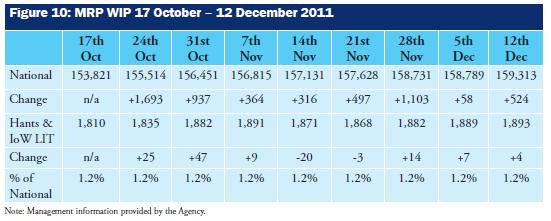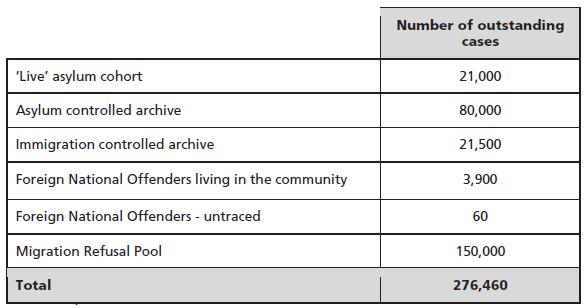Who are the 170,000 'missing' migrants in the UK?
House of Commons Committee Room 8 was abuzz with revelations after the Chief Executive of the UK Border Agency (UKBA), Rob Whiteman, gave evidence to the Home Affairs Select Committee on the latest updates on the UKBA's work. From this meeting alone followed a slurry of news reports this morning:
Guardian: "Capita plc, the support services supplier, has been given a contract worth up to £40m over four years to find more than 170,000 missing migrants"
Daily Mail: "The Border Agency has enlisted a private firm to help track down up to 170,000 missing immigrants"
Telegraph: "More than 170,000 immigrants refused leave to stay in Britain are to be tracked down by private-sector "bounty hunters"
Mr Whiteman revealed to the Committee that Capita plc - a support services supplier - had been awarded a contract by the UKBA to track down these 170,000 missing people with the ultimate aim of removing them from the country.
So who exactly are these 170,000 'missing' people?
The earliest published information on the statistic dates back to 5 July this year from an Independent Chief Inspector of Borders and Immigration inspection of the Hampshire and Isle of Wight Local Immigration Team.
This report, complied by John Vine, received a great deal of media coverage as it revealed 150,000 'missing' people. These people were referred to in the report as being part of the 'Migration Refusal Pool'. The report is helpful enough to explain what this means:
"The Migration Refusal Pool (MRP) consists of those cases where an application has been made in the UK to remain as, for example, a student, and has been refused. Applicants are given notice that they must leave the UK within 28 days.
"Following the decision to refuse the application, but while the applicant is still in the UK, cases are referred to as Work In Progress (WIP). There are various types of case categories within this WIP, including individuals who:
• have been refused and should leave the UK, but have not done so;
• may have applied for leave in another category;
• have outstanding appeals or other legal barriers; or
• have left the UK voluntarily by a route not captured by E-borders."
Conservative MP James Clappison summed this up neatly during the Committee questions:
"It's a record of people who may have stayed in the country when they should not have done so and don't have permission to be here"
How do we know how many there are?
This isn't clear. The Independent Chief Inspector's report lays out some of the most recent estimates of the size of the pool, both nationally and for Hampshire and the Isle of Wight:

This doesn't show the '170,000' figure, but the UKBA informed Full Fact that more up-to-date information was provided in their own evidence to the Home Affairs Committee. Unfortunately, this hasn't yet been published; the best we've got to go on is Rob Whiteman's verbal confirmation that the Migration Refusal Pool currently has "over 170,000" people.
This, Mr Whiteman explained, was essentially a record of the number of people who the UKBA had contacted to inform them to leave the country within 28 days. But since they aren't all yet being counted out, these are only people who may still be here.
They're also not the only ones. The Home Affairs Committee published a breakdown earlier this year of what they consider to the be UKBA's 'backlog' of cases:

How long have these people been here, if they still are here?
James Clappison MP appeared to speak for the whole Committee in questioning why these 170,000 people had suddenly 'appeared' in July and how long the UKBA had known about them. After some questioning, Rob Whiteman confirmed that:
"These are cases that have been counted since 2008"
So not only do we not know who these people are, nor how many are still in the country, we didn't even know that the problem existed for four years after the records began to be counted nationally.
It certainly lends credence to the much-reused claim that there are things we "don't know we don't know". Until recently these 170,000 people were a prime example.
In the meantime we'll have to wait till the Home Affairs Committee publish their evidence before we learn more about the latest figures.